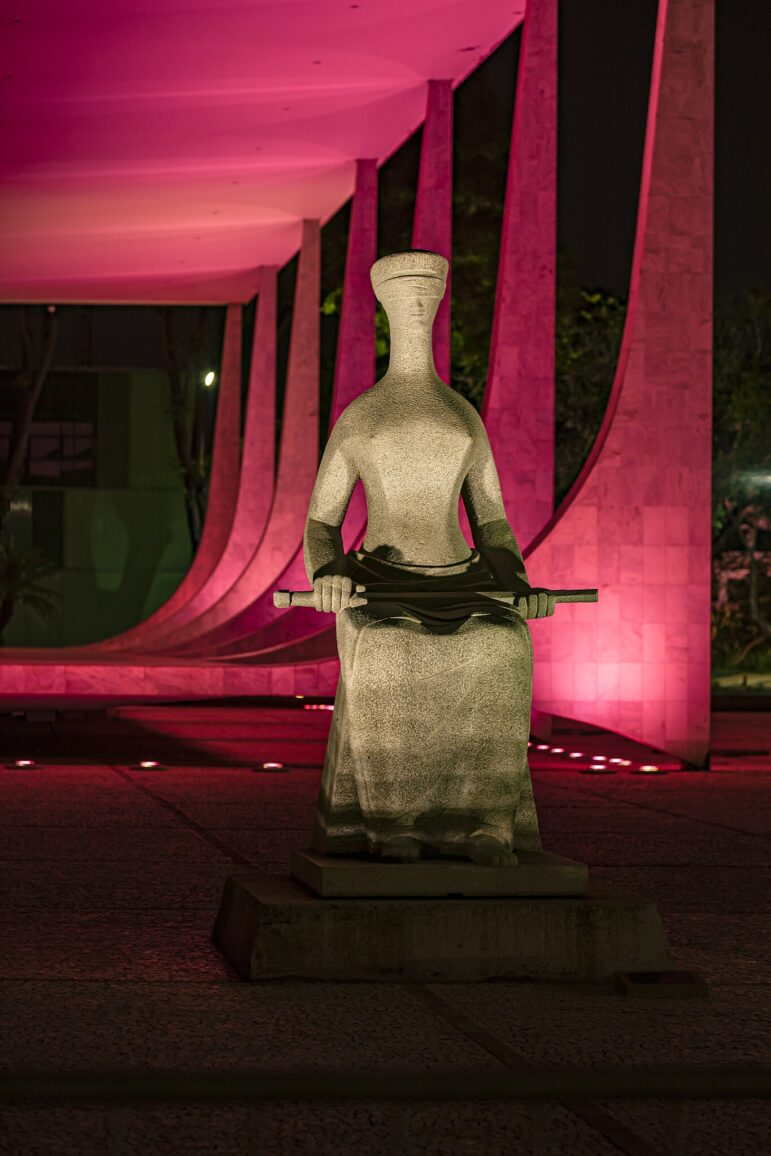BRASILIA – The Temporal Framework Law (Marco Temporal) in Brazil has become one of the most contentious issues surrounding Indigenous rights, environmental conservation, and religious freedom in Brazil. The law stems from the interpretation of Article 231 of Brazil’s 1988 Constitution, which guarantees Indigenous peoples the right to their traditional lands. However, the Temporal Framework limits those rights to lands that Indigenous communities physically occupied or were actively disputing as of October 5, 1988, the date the Constitution was enacted.
The changes in Brazil affect the global community not only because of its effect on the vast and largest rainforests on the planet but also because the debate is influencing the struggles for Indigenous land rights in other nations.
As The Wild Hunt reported earlier this year, Brazil’s Supreme Federal Court ruled against the Temporal Framework doctrine, affirming broader land rights for Indigenous peoples. The decision was widely celebrated by Indigenous communities, who argued that displacement and violence had often prevented them from occupying their ancestral lands in 1988.
Despite the ruling, the debate shifted to Brazil’s Congress. In October 2023, lawmakers passed legislation enshrining the Temporal Framework into law. President Luiz Inácio Lula da Silva partially vetoed the bill, striking provisions that restricted Indigenous land rights. However, in December 2023, Congress overrode most of Lula’s vetoes, enacting the law with its provisions favoring Indigenous rights intact.

Justice Statue at the Supreme Federal Court in Brazil [Photo Credit: Dasfour2022 CCA-SA 4.0
Supporters of the Temporal Framework, including agribusiness and rural landowners, argue that it provides legal certainty for investments and economic activities, particularly in the Amazon and rural areas. They warn that expanded Indigenous land rights could disrupt development and lead to conflicts over ownership.
Conservationists and climate experts emphasize that Indigenous land demarcation is essential for protecting biodiversity and combating climate change. Research consistently shows that Indigenous-managed lands are some of Brazil’s most ecologically intact areas, serving as critical barriers against deforestation and environmental degradation.
A significant twist in the Temporal Framework debate has been the involvement of Brazil’s Evangelical Parliamentary Front (Frente Parlamentar Evangélica, or FPE). Known as the “Evangelical Caucus,” this influential political bloc has been instrumental in advancing the Temporal Framework Law.
An essay analysis published by O Jornal de Todos os Brasis revealed that approximately 88% of FPE members voted to overturn President Lula’s vetoes during the December 2023 session. Of the 232 caucus members, 174 voted to uphold the Temporal Framework Law, accounting for nearly half of the total votes against Indigenous rights in Congress.
The vote exposed the deep ideological and economic ties between the Evangelical Caucus and agribusiness interests. Critics have noted that the caucus’s actions perpetuate historical injustices against Indigenous peoples, aligning religious and economic agendas to undermine Indigenous sovereignty.
The Evangelical Caucus’s political stance mirrors intensified efforts by evangelical churches to proselytize within Indigenous communities. While framed as salvationist, these missions often have the effect of eroding Indigenous cultural integrity. Many Indigenous leaders view these actions as a violation of their autonomy, describing them as an “invasion of our lands without our permission.”
Critics have called for urgent advocacy to address these contradictions and counter what they see as a dual assault—political and spiritual—on Indigenous rights.
The Temporal Framework debate also intersects with a broader trend in Brazil: the rise of religious intolerance. Neo-Pentecostal evangelical churches, which have expanded rapidly since the 1970s, have often targeted Afro-Brazilian religions such as Candomblé and Umbanda.
Experts note that while most neo-Pentecostal proselytizing is “peaceful”, it has frequently been accompanied by discrimination, destruction of temples, and forced expulsions. In Rio de Janeiro—home to a quarter of Afro-Brazilian religious practitioners—cases of religious intolerance have doubled over the past six years. Between 2018 and 2023, the Brazilian government recorded a 140% increase in complaints of religious intolerance, with incidents ranging from verbal harassment to arson.
Brazil’s Minister for Human Rights, Macaé Evaristo, has emphasized the need to defend religious freedom. In September 2023, Evaristo joined thousands of practitioners from diverse faiths at the March for the Defense of Religious Freedom in Rio de Janeiro. The event highlighted the challenges faced by Afro-Brazilian religious communities and underscored the broader fight for equality and tolerance.
Посмотреть эту публикацию в Instagram
“The great challenge today in our country is to reduce inequality,” Evaristo told the state-run Agência Brasil news agency. “It is important to be present in this march because the people here are struggling for many things, like decent work and a life free from hunger.”
As Brazil grapples with the Temporal Framework Law, its implications extend far beyond land rights. The law encapsulates deep societal divisions—between economic development and environmental preservation, between Indigenous sovereignty and agribusiness interests, and between religious proselytism and freedom.
For Indigenous communities, conservationists, and human rights advocates, the struggle represents more than a legal battle. It is a fight for justice, equity, and the soul of Brazil’s democracy—a battle intertwined with efforts to counter discrimination against minority faiths, particularly those originating from African Traditional Religions.
Indigenous leaders and activists continue to call for popular pressure and international advocacy to prevent further erosion of their rights. For them, the Temporal Framework Law is not just a policy—it is a symbol of the broader fight for their survival, cultural identity, and rightful place in Brazil’s future.
The Wild Hunt is not responsible for links to external content.
To join a conversation on this post:
Visit our The Wild Hunt subreddit! Point your favorite browser to https://www.reddit.com/r/The_Wild_Hunt_News/, then click “JOIN”. Make sure to click the bell, too, to be notified of new articles posted to our subreddit.